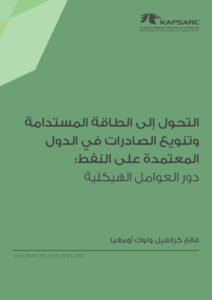
التحول إلى الطاقة المستدامة وتنويع الصادرات في الدول المعتمدة على النفط: دور العوامل الهيكلية
من المتوقع أن تكون للتحولات نحو نزع الكربون التي يشهدها مجال الطاقة انعكاساتُها على الدول المنتجة للوقود الأحفوري، وإن كانت الدول المصدرة للنفط تُعد حتى الآن من اللاعبين الرئيسين في الاقتصاد المعاصر. ولما كان الأمر كذلك فإن التحول إلى الطاقة المستدامة لن يُكلَّل بالنجاح ما لم تحافظ هذه الدول على استقرار اقتصاداتها، ويمكن لهذه الدول حماية الاقتصاد من تذبذب العائدات والتخفيف من مخاطر الكربون بانتهاجها مبدأ تنويع الاقتصاد. لكن تنويع الصادرات على وجه الخصوص يبدو أمرًا صعبًا في العديد من الدول المنتجة للنفط. وهنا من الطبيعي أن نتساءل عن أسباب نجاح بعض الدول المصدرة للنفط في تنويع اقتصاداتها بينما لم تنجح الدول الأخرى.
11th مايو 2023